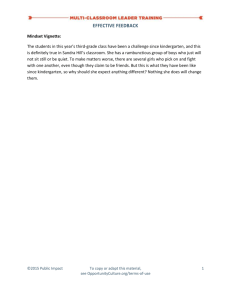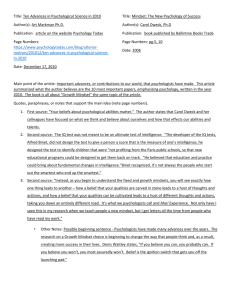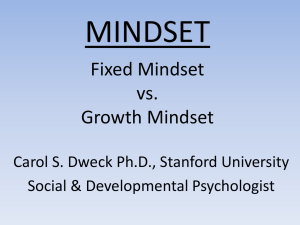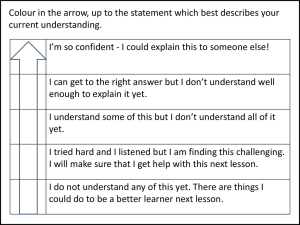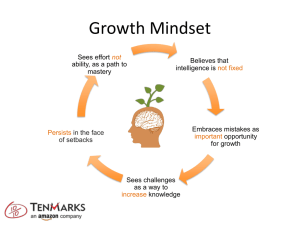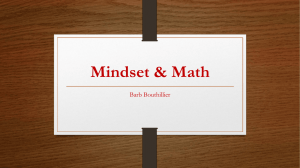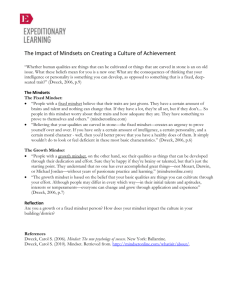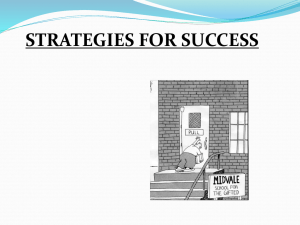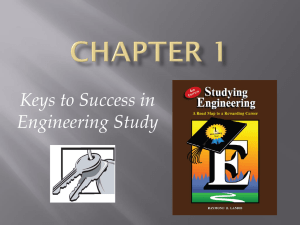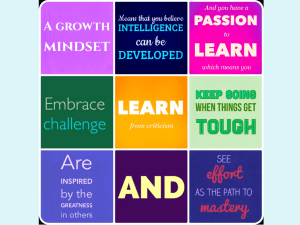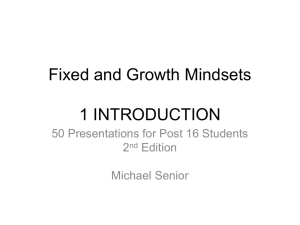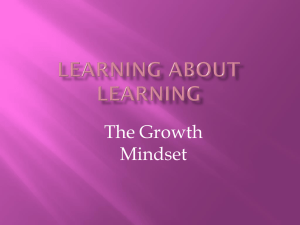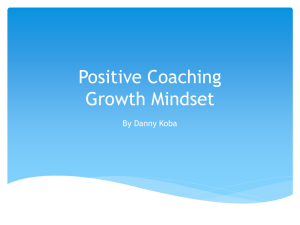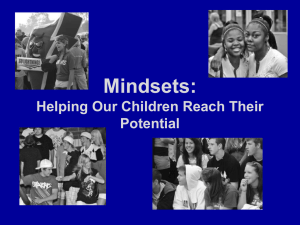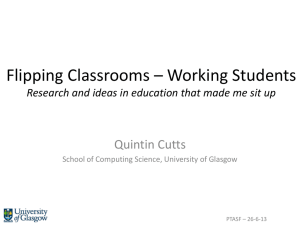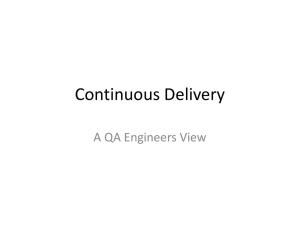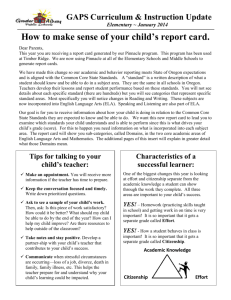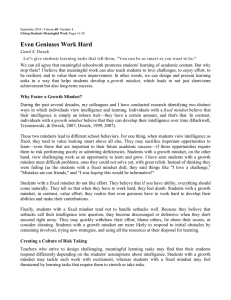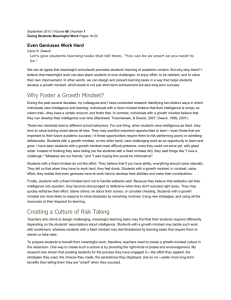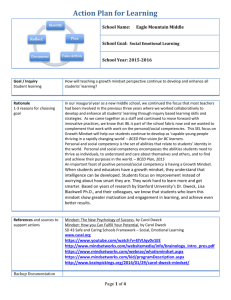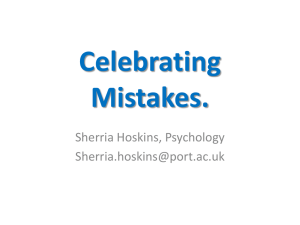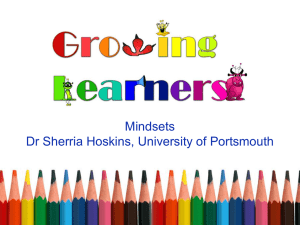Growth Mindset - Fremont Unified School District
advertisement
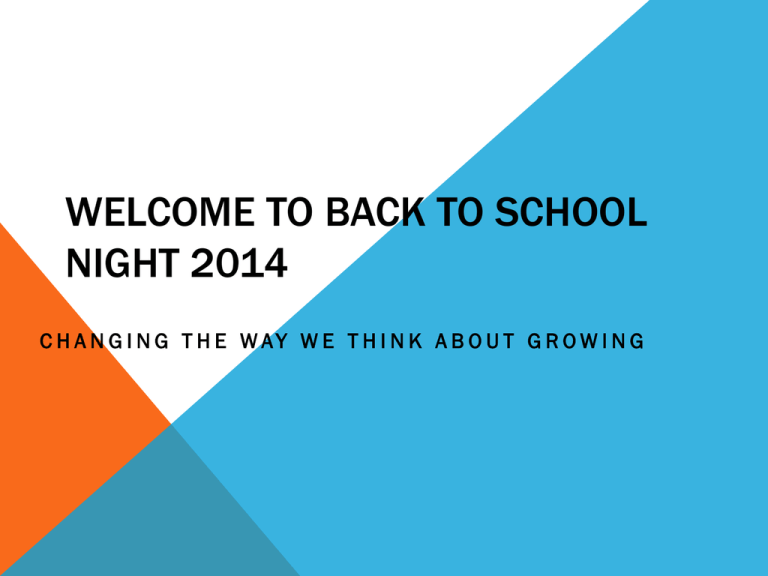
WELCOME TO BACK TO SCHOOL NIGHT 2014 C H A N G I N G T H E WAY W E T H I N K A B O U T G R O W I N G FOCUS FOR 2014-2015 Implementation of the Common Core State Standards Transition to a new Report Card format Growth Mindset TRANSITION TO NEW REPORT CARD FORMAT District-wide grade level teams, along with guidance and support from school and district administrators, have developed standards-based Common Core report cards for kindergarten through grade six. This year, we will continue to use grades to measure student achievement. This will be an O, S, and N grade in grades 1-3 and A, B, C, D, and F grades in grades 4-6. Beginning next year, the new report card will use numerical indicators of student performance to indicate your child’s progress on the grade level standard. It is important to note that the report card is only one part of an effective reporting system for student progress. MINDSET As we implement the Common Core this year, our school will be emphasizing and teaching about having a growth mindset because we believe that this is foundational to helping our students to have the motivation to persist in the face of setbacks and difficult challenges. THE RESEARCH World-renowned Stanford University psychologist, Carol Dweck, discovered the concept of mindset after decades of research on achievement and success. This is a simple concept that when understood has a huge impact on how people of all ages respond to failure and difficulty. WHAT IS A GROWTH MINDSET? In a growth mindset, students believe that their most basic abilities, talents, and intelligence can be improved upon and increased through consistent effort and perseverance through challenging tasks. In other words, the key to success in any endeavor is hard work because it pushes our malleable brain to grow and develop to meet the challenge. WHAT IS A FIXED MINDSET? A fixed mindset is the belief that traits like intelligence are “fixed” or “static” and determined at birth. This leads to a corollary belief that talent alone leads to success and that it should be effortless. These beliefs tend to cause people to give up early when they meet with failure in a particular subject or sport or any other aspect of their lives. AFTER SETBACK (QUOTES FROM STUDENTS) Fixed Mindset: “I’d spend less time on this subject from now on.” “I would try not to take this subject ever again.” “I would try to cheat on the next test.” Growth Mindset: “I would work harder in this class from now on.” “I would spend more time studying for the tests.” Blackwell, Trzesniewski and Dweck, 2007 THE POWER OF PRAISE Dr. Dweck’s decades of research reveal that one of the most important things we can do with children to promote a growth mindset is to praise them for the effort and persistence they demonstrate to accomplish a task— especially a task that forces them to stretch and grow through dedicated work and practice and which may initially lead to failure and setbacks. MESSAGES ABOUT WHAT WE VALUE Intelligence Praise: “Wow, that’s a really good score. You must be smart at this.” Effort (Process) Praise: “Wow, that’s a really good score. You must have tried really hard.” YESTERDAY’S PRAISE: “Look, you got an A without really working. You’re really good at math!” “You did that so quickly and easily. That’s impressive!” TOMORROW’S PRAISE: “You got an A without working. An A is nice, but you must not be learning much.” “You did that so quickly and easily. I’m sorry I wasted your time. Let’s do something you can learn from.” THE POWER OF YET I’m not good at _____... I can’t do ______... I tried but it didn’t work… SUMMARY Embrace learning and growth Understand the role of effort in creating talent Maintain confidence and effectiveness in the face challenges and setbacks …and it can be taught. MINDSET SAYINGS Effort is Everything. Perfect doesn’t live here. Fast is not an option. Learning means taking risks. Learning changes my brain. I’m in charge of my own intelligence.
